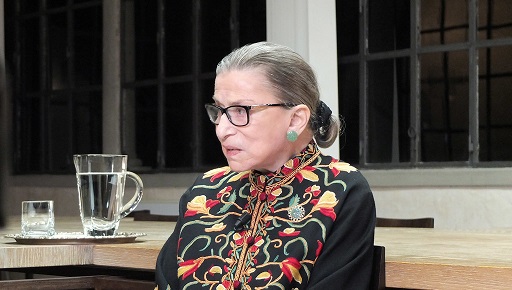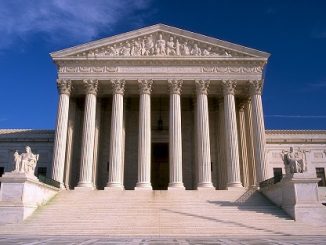
US Supreme Court Justice Ruth Bader Ginsburg, an iconic champion of women’s rights, has died of cancer at the age of 87, the court has said.
Ginsburg died on Friday of metastatic pancreatic cancer at her home in Washington, DC, surrounded by her family, the statement said.
Earlier this year, Ginsburg said she was undergoing chemotherapy for a recurrence of cancer.
She was a prominent feminist who became a figurehead for liberals in the US.
Ginsburg was the oldest justice and the second ever woman to sit on the Supreme Court, where she served for 27 years.
“Our Nation has lost a jurist of historic stature,” Chief Justice John Roberts said in a statement on Friday. “We at the Supreme Court have lost a cherished colleague. Today we mourn, but with confidence that future generations will remember Ruth Bader Ginsburg as we knew her – a tireless and resolute champion of justice.”
As one of four liberal justices on the court, her health was watched closely. Ginsburg’s death raises the prospect of Republican US President Donald Trump trying to expand its slender conservative majority, even before this November’s election.
In the days before her death, Ginsburg expressed her strong disapproval of such a move. “My most fervent wish is that I will not be replaced until a new president is installed,” she wrote in a statement to her granddaughter, according to National Public Radio.
President Trump is expected to nominate a conservative replacement for Ginsburg as soon as possible, White House sources told BBC partner CBS News.
Mr Trump reacted to Ginsburg’s death after an election rally in Minnesota, saying: “I didn’t know that. She led an amazing life, what else can you say?”
Ginsburg had suffered from five bouts of cancer, with the most recent recurrence in early 2020. She had received hospital treatment a number of times in recent years, but returned swiftly to work on each occasion.
In a statement in July, the judge said her treatment for cancer had yielded “positive results”, insisting she would not retire from her role.
“I have often said I would remain a member of the Court as long as I can do the job full steam,” she said. “I remain fully able to do that.”
Why was Ginsburg important?
US Supreme Court justices serve for life or until they choose to retire, and supporters had expressed concern that a more conservative justice could succeed Ginsburg.
The highest court in the US is often the final word on highly contentious laws, disputes between states and the federal government, and final appeals to stay executions.
In recent years, the court has expanded gay marriage to all 50 states, allowed for President Trump’s travel ban to be put in place and delayed a US plan to cut carbon emissions while appeals went forward.
Ginsburg’s death will spark a political battle over who will succeed her, spurring debate about the future of the Supreme Court ahead of November’s presidential election.
Donald Trump has appointed two judges since taking office, and the current court is seen to have a 5-4 conservative majority in most cases.
The US Senate has to approve a new judge nominated by the president, and Senate majority leader Mitch McConnell said on Friday evening that if a nominee was put forward before the election, there would be a vote on Mr Trump’s choice.
But the Democratic challenger Joe Biden said: “There is no doubt – let me be clear – that the voters should pick the president and the president should pick the justice for the Senate to consider.”
What is Ginsburg’s legacy?
Over an illustrious legal career spanning six decades, Ginsburg attained unparalleled celebrity status for a jurist in the US, revered by liberals and conservatives alike.
Liberal Americans in particular idolised her for her progressive votes on the most divisive social issues that were referred to the Supreme Court, from abortion rights to same-sex marriages.
Born to Jewish immigrant parents in Brooklyn, New York City, in 1933, Ginsberg studied at Harvard Law School, where she was one of only nine women in a class of about 500 men.
Ginsburg did not receive a single job offer after graduation, despite finishing top of her class. But Ginsburg persisted, working in various jobs in the legal profession throughout the 1960s and far beyond.
In 1972, Ginsburg co-founded the Women’s Rights Project at the American Civil Liberties Union (ACLU). That same year, Ginsburg became the first tenured female professor at Columbia Law School.
In 1980, Ginsburg was nominated to the United States Court of Appeals for the District of Columbia as part of former President Jimmy Carter’s efforts to diversify federal courts. Though Ginsburg was often portrayed as a liberal firebrand, her days on the appeals court were marked by moderation.
Ginsburg was appointed to the Supreme Court by former President Bill Clinton in 1993, becoming only the second of four female justices to be confirmed to the court.
Toward the end of her life, Ginsburg became a national icon. Due in part to her withering dissents, Ginsburg was dubbed the Notorious RBG by her army of fans online – a nod to the late rapper The Notorious BIG.
That comparison introduced Ginsburg to a new generation of young feminists, turning her into a cult figure.
What reaction has there been?
Former presidents, veteran politicians and senior jurists were among those to mourn the loss of Ginsburg on Friday. They commended her accolades and hailed her commitment to women’s rights.
Former President Jimmy Carter called her a “truly great woman”, writing in a statement: “A powerful legal mind and a staunch advocate for gender equality, she has been a beacon of justice during her long and remarkable career. I was proud to have appointed her to the US Court of Appeals in 1980.”
Praising her “pursuit of justice and equality”, former President George W Bush said Ginsburg “inspired more than one generation of women and girls”.
Hillary Clinton, a Democrat who ran against President Trump in the 2016 presidential election, said she drew inspiration from Ginsburg.
Conservative politicians also paid their respects to Ginsburg.
“It was with great sadness that I learned of the passing of Justice Ginsburg,” Republican Senator Lindsay Graham said on Twitter. “Justice Ginsburg was a trailblazer who possessed tremendous passion for her causes. She served with honour and distinction as a member of the Supreme Court.”
Eric Trump, the son of President Trump, said Ginsburg was “a remarkable woman with an astonishing work ethic”. “She was a warrior with true conviction and she has my absolute respect! #RIP,” he wrote on Twitter.
A high-stakes political fight looms

Ginsburg’s death injects a level of unpredictability into a presidential race that had been remarkably stable for months. Now, not only will the White House be at stake in November, but the ideological balance of the Supreme Court could be, as well.
It all depends on what President Trump and the Republicans choose to do next. They could try to fill the seat before the end of the year regardless of who wins the presidency in November, replacing a liberal icon with what in all likelihood will be a reliable conservative vote. Or they could wait and hold the seat vacant, a prize to encourage conservative voters – particularly evangelicals who see an opportunity to roll back abortion rights – to flock to the polls for the president.
Filling the seat would outrage Democrats, who will note that Republicans denied former President Barack Obama the chance to fill the vacant seat in 2016 for months. Waiting, on the other hand, would risk letting Democratic presidential contender Joe Biden name Ginsburg’s replacement in 2021.
All signs point to Republicans trying the former. Concerns of hypocrisy will melt away when a lifetime appointment to the court is in play.
Either way, it sets up a brutal, high-stakes political fight that comes at a time when the nation is already rife with partisan discord and psychological distress.
Source: bbc.co.uk






Be the first to comment